It’s been 15 years since The Daily made its New York Fashion Week debut. Founder Brandusa Niro sat down with staffers Ashley Baker and Eddie Roche to tell the story of how it all came to pass.
First things first: How did you come up with the idea for The Daily?
I had created an online fashion news site in 1998 called Fashion Wire Daily, which was based on subscription and syndication. The idea was to deliver fashion news through the Internet, which in those days, was a very new thing. Computers were still running on DOS! I raised about $6 million in a few rounds from investors like Ron Perelman. It was very successful. Everyone was on it; we were carried on AP and hundreds of other places, and we became profitable by year 2. Then, of course, there was 9/11, which destroyed everything — suddenly nobody cared about fashion content and the syndication model crumbled. I sold my share in the business, and five minutes later, Vicki Rose, the publisher of Us Weekly, which was a big success in those days, came up with the idea to call that girl who was doing that site that everyone was so obsessed with, and see if she could do a daily magazine for Us at Fashion Week, so she could sell some ads. It was a very, very smart idea. I had an aha moment — yes, there was a way to monetize an original, fun, fearless fashion news publication, even without the syndication, by doing it in print. I worked for them for a month, doing three issues of Us Weekly during Fashion Week. It was a hit, even though it was branded as Us Weekly, so the look of it wasn’t quite my style and I definitely couldn’t imagine luxury advertisers running in it. I knew that we could create a real Fashion Week daily in print that would be a success. Right after I finished production on that, I went and saw Chuck [Bennett] at IMG.
I knew him before, and I had spoken about it with Fern [Mallis], who really encouraged me to pitch it.
How did Chuck react?
It was amazing how fast he made it happen. I came to him with a [profit-and-loss statement] with exactly how much money it would cost to make it, and exactly what I projected our net income would be—I am very left-brained/right-brained, and I think that is the secret to running a media business. My father was a CFO, and my mother was a creative person—a writer, poet, and professor. As a child, I wrote poems and short stories, I even won a national short-story contest, but meanwhile, when I was going to visit my dad at the office, I was obsessed with spreadsheets. I get a real joy out of hitting targets, getting the numbers right and closing a deal, but I also adore the creative aspect, and I would die without it. Chuck was super successful, he had created a $100 million business in IMG Models and the Fashion Week event, but despite being part of a giant global corporation, he was still a total entrepreneur and definitely one of the smartest guys I’ve ever met. With that fabulously sexy gravelly voice of his, he said, “Let’s do it!” He was a fan of what I’d done at Fashion Wire Daily, and he liked what I’d presented, so within three weeks, I had a job and an office. And then the panic set in! We had no staff or prototype, and I was supposed to generate hundreds of thousand of dollars worth of advertising…and this was eight weeks before Fashion Week! And you know what? I just did it. We actually made $100,000 profit on the first season.

Daily Front Row, Issue 1
How did you do it?
It was magic! I’ve always believed in karma. I knew so many people, and I’ve always been good to everyone. So I called them, and they gave me a chance. They said, if you do it, we’ll support. I will never ever forget our charter advertisers. I owe them everything. So, we started with five issues, and it was a big success from the very first moment. I was only working with Christine Muhlke and Mark Jacobs, and Tangie [Silva] who’s still with me after 15 years, plus a couple of freelancers, and we just…did it!
Let’s backtrack a bit—you grew up in Bucharest during the Ceausescu era. What were you like
as a child?
Spoiled rotten! I was a cherubic Goldilocks who everybody adored because I was the first kid in my family. I had the most wonderful childhood. The whole communist dictatorship thing? I only started feeling it once I got into school a bit later, when you had to study absurd things like Marxism and a propaganda-laced version of 20th-century history. You had to resist being brainwashed all day long—at school, on TV, in the newspapers, we were being lied to constantly. That experience turns you into a rebel and independent thinker, automatically. After I became a person who could actually understand what was happening around me, I knew that we Iived in a very big cage. You could walk around and there were no chains, but otherwise you’re in jail. The cops would stop you in the street for wearing a miniskirt, or if you were a boy with long hair they’d stop you, take you to the station, and shave off your hair. You always had to have your ID with you, and if you wanted to speak your mind among your friends, you had to turn on the radio really loud because the phones were bugged. It was a police state. Immediately, my idea of happiness and driving force in life became to be free. No imposition from anybody. I run my own life. I’ve functioned really well within companies and within structures, but I have to be around kindred spirits. That’s why working with Chuck at IMG was fantastic. He feels exactly the same way about freedom as I do. The minute anybody tries to crush my spirit, I’m done.
True or false: Your uncle, Toma Caragiu, was the Gérard Depardieu of Romania.
Absolutely, but a lot thinner and better-looking! He was the most prolific, brilliant, legendary actor—the one that even today, everyone talks about. He died in the earthquake of 1977, but I still meet young Romanians who are obsessed with him today. He was a great comic and also a truly great actor—he sang, the whole thing. He didn’t politicize anything openly, yet he politicized everything. Ceausescu invited Toma to dinner for New Year’s Eve to watch his famous midnight monologue on television—the whole country was waiting for it each year. Even in villages where there was just one house with a TV, they’d all huddle at midnight to watch him. He hilariously made fun of all the miseries of life in Romania, and indirectly of the very people he was dining with. And they laughed along with him. That sense of humor seeped into me, in many ways. You have to make fun of the crappier things in life. It’s how you survive them. We did a “Chic Must Go On” party during the recession in 2009, remember?
We’ve heard murmurings that you were something of an actress yourself…
[Laughs] I was! It was purely by default. What I really wanted to be was the editor of a fashion magazine, precisely. I adored Elle in those days, but in Romania, you couldn’t even find it in a proper store—you had to buy it on the black market. My mother wanted me to be a novelist, but I thought magazines were cooler. I like things that are fast and joyful, and I’m also very visual. When I was 4, I developed a passion for the theater. My parents were working a lot—my mother was a professor at the university; my father was always traveling—so my grandpa Nico parked me at the theater, to see Toma rehearse and to see the matinees. I think I’ve seen certain plays 50 times, not counting rehearsals! I was a bit of a mascot. I would sit in the first row, and he and the other actors would wink at me from the stage. I was reciting their lines backstage with them, so yes, acting came naturally. Because I grew up in that entourage, I was spotted by one of Toma’s friends, who cast me in a movie when I was 16. It was a supporting role, but I got very good reviews.

Bandusa Niro’s headshot
I finished high school at 17 and a half and had to decide about college. My mother said, “How are you going to be a magazine editor in a country that has no magazines and no fashion?” I wanted to go to Paris. I had traveled quite a bit, because my mother had a guest professorship in Salzburg for three years, so I had seen all of Italy and France. Normally, you weren’t allowed to have a passport and travel, but my mother made it happen. So I pondered becoming a serious writer. It felt so boring, though—me alone, with a typewriter. Then Toma told me I would be a great comedienne. I was kind of babelicious in those days—I didn’t have the talent for tragedy or such, but I was super funny. So I went to drama school—I got one of 18 spots, out of 300 applicants. Those were the best times. We were doing improv, working until 2 a.m. every night, starting over at 7 the next morning. I played Masha in Three Sisters, Rosalind in As You Like It—and we were either rehearsing or performing every night. It was 20-hour days for four years and the best time of my life.
Did you do any television?
Seven or eight times, and some of it even included singing, which is hilarious, because I have absolutely no singing voice. I made two other movies—one of them, Uncle Marin, the Billionaire, is celebrating its 40th anniversary this year, and I’ve had tons of interview requests from Romania in the past weeks. I played a billionaire’s daughter who was kidnapped. I basically ran around trying to escape the whole time. To this day, this was the most successful movie at the box office in Romania. But all of this came to an end after my uncle died in ’77.
So, what happened?
I moved to Paris. I needed to breathe. I met an amazing group of émigrés, including Eugène Ionesco, spent a New Year’s Eve in Gauguin’s former atelier, and loved it there, but I did not see myself building a life in Paris. I would have had to conform and change. I ended up in Toronto, where I worked for various magazines, like L’Express, doing a lot of fashion profiles, which is how I met the president of Hugo Boss and we became good friends. He was reassigned to New York as president for North America, and I went to work for him there.
What was it like?
The Hugo Boss era was fantastic. Our offices were in the Olympic Tower in the old Onassis apartment. Everything was mirrored, felt amazingly ’70s. In those days my job was called VP of marketing, reporting directly to the global marketing head in Germany, as well as the U.S. president. And then after Hugo Boss, I consulted for The New Yorker while I built up a marketing company. But all through that time, I was putting together the idea of an Internet business.
How many languages do you speak?
Romanian, Italian, French, and English. I can sort of understand German and Spanish.
Your mastery of the English language is incredible.
Except for the accent! [Laughs] I never tried to lose it. But I have to thank my mother for this. She was a professor of linguistics who spoke and wrote fluently in eight languages, and had significant knowledge of another eight. She always insisted that, because nobody outside of Romania spoke our language, a civilized person has to have impeccable fluency in two or three other languages by a certain age.
The Daily is known for its sense of humor. Is that what took the industry by surprise?
I think so. People were saying, “It’s so funny.” They weren’t sure if they were allowed to laugh—the fashion world was extremely serious then! Anna, the glasses, you know, everyone desperately trying not to crack a smile. I found that absolutely hilarious. Gawker started around the same time as us, and we were adoring it right away, although we didn’t like the nastiness. In The Daily, we celebrated the people behind the scenes, and we did so with great love for these characters and their talents. But we did it cheekily! Never a bite, just a nibble…quickly followed by a kiss! Everyone was shocked and surprised — I remember Ingrid [Sischy] saying, “Brandusa, this thing is so funny! I wasn’t sure at first, but it’s good!” André Leon Talley was the only one who scoffed at us, but then he came around.
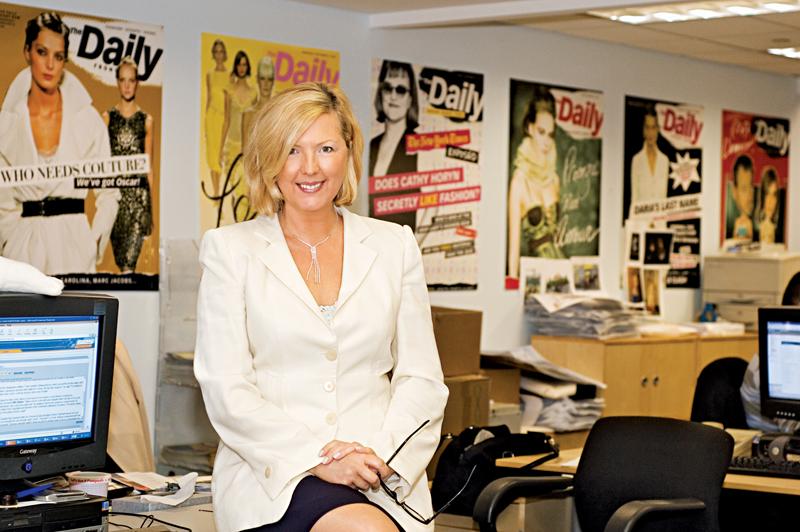
Brandusa Niro at The Daily’s offices at IMG
Who were the It Kids back in 2003?
Zac Posen was everything back then. We first wrote about him in Fashion Wire Daily—Karin Nelson used to work for me, and she spotted him—and he came to a party we did. He was literally 18, and he came with Jordana Brewster. They were so gorgeous. Obviously, he was a big favorite for our first season. We did a “Who’s Who” in fashion, and we obsessed about Cathy Horyn from the very beginning. We also wrote about Amy Spindler, who I worshipped—really, such a talent—I miss her writing to this day.
When did Graydon Carter discover The Daily?
We had a relationship dating back to my days at Hugo Boss. I was doing the media buying, and obviously, every publisher and editor in chief were adoring the little Brandusa and the giant Hugo Boss budget. I had a massive professional crush on him; he is a genius. We had lunch together to just talk at The Royalton, and it was always such fun seeing him. We have a similar sense of humor. When I launched The Daily, he told me, “This is the best and most original magazine I’ve seen in ages!” He always, always gave me such props.
He called it his second-favorite magazine.
You’re right, he did [onstage at the Fashion Media Awards]! He comes from Spy and you know, The New York Observer under him was heaven. We can never forget our funny roots, because then, we lose our soul.
People always ask us, “What’s your secret? How do you put out all these glossy magazine issues every day?” How do you answer that?
The answer is have a sense of fun, and don’t agonize. I hate agonizing. If it makes us happy, we run it. I am very visual as you know, and the look of our pages makes me crazy with joy. I just want to kiss these pages. I want to take them to bed and sleep with them. In fact, I do. During Fashion Week, we have in bed me, [my dog] Desi, [my husband] Giorgio, and that day’s issue of The Daily. That’s my family. But the real secret is you. We have an incredible team that’s been here a long time and crafted the voice and the spirit of The Daily with me. If even one of you isn’t here, it makes it incredibly hard. We share the same humor, the same passions, the same love for immediacy. I love, love, love the immediacy! The fact that everybody reads us the next morning, and sends us their reactions? Amazing.
How did you come up with the name The Daily?
I’ve always believed in simple, to-the-point names. Ditto for headlines, ditto for stories. Let’s just call it what it is. But then IMG legal said we couldn’t protect it by copyright, because it’s too generic, so we had to add something, which is how we added “Front Row.” We were really the first people to cover the front row—before, the boldfaced names in fashion just referred to the designers. From the very beginning, The Daily didn’t look or read like anything else—it’s a completely original, unique project.
Have you ever had any disagreements with publicists over the years?
[Laughs] Rarely, although I did hang up on a certain publicist with a French accent who had the audacity to call me about contacting one of his clients directly — a designer whom I greatly like and admire, and for whom we did lots of coverage. The designer was appalled to learn from me that his publicist blocked access to The Daily’s reporter at the show. Five minutes later, the publicist calls to say, “How dare you get in touch with my client directly,” and some other such arrogant nonsense. Suffice it to say, after 60 seconds of this, I hung up on him. He called back and said, “Are you hanging up on me?” And I said, “Yep, I am.” I didn’t like his approach—I don’t need anyone’s permission to call a designer. I was very clear with him—I am going to call whoever the hell I want. I may have told him that he was getting paid because people like me chose to write about his clients. But this guy was an exception and that kind of old-school BS is passé. 99.9 percent of publicists have been fantastic to work with, and we consider them so important to our business and our content.
Ha! Memories! In 2008, I was covering the Dior show in Paris and I have a distinct memory of getting a news alert about the cratering Dow and the collapse of Lehman Brothers. How were you feeling at the time?
We had to be brave and creative and consider it an opportunity to challenge ourselves. I don’t believe in giving up, which is why we are still here today, and not only here, but we’re much stronger than we were then. I haven’t escaped communist Romania to be afraid of a little recession. And we made it! We hunkered down and protected our people and our business—I wouldn’t want to go through it again, though, because I’m sure it took a few years off of the end of my life.
How did you end up buying The Daily in 2010?
It was the scariest thing I’ve ever done. But to me a crisis is an opportunity. And I’m sort of fearless, as you can see.
Except when it comes to the doctor!
[Laughs] Right. How well you know me! Scared of the flu, but totally fearless when it comes to business. The main thing was I didn’t want a backer. So many people had offered to back me with private equity money, but then, you don’t really own it. So I had to do it my way, and this was 2010, the banks weren’t lending. Good thing I didn’t have any kids to put through college! And IMG was amazing. They gave time to pay for the business, and they also made it possible for me to continue the [distribution] relationship with the Fashion Week event. I will be forever grateful for this.
How did it go?
We literally doubled our revenues over three years. On our own, we were able to move quickly and nimbly. This is exactly what I had wanted—
freedom. And right now the business environment
is excellent.
How did the Hamptons edition come about?
Talk about fearless. I was sitting in our new offices in Time Inc.—and thank you, Martha Nelson, for giving us a home there for five years. It made everything so much easier. But here I was, not only do I have to deal with meeting payroll and paying the printers, but I wanted to expand! I called Richard Burns and made a joint venture with Dan’s Papers. I wanted to learn how to distribute and publish in the Hamptons and they were the gold standard—they’d been around for a million years. That joint venture didn’t turn out to be the answer for us in the Hamptons, but we learned everything. The Daily Summer is the best thing we could have thought of. It’s a jewel, and it grew exponentially and took over a big part of the local market share. In the Hamptons, magazines will never go away. You can’t read an iPad on the beach. And there’s a luxury audience there that will always enjoy the pleasure of a beautiful fashion magazine and will shop off of its pages.
Are magazines going away?
Magazines are becoming a premium product. Big magazines with huge circulations and big ad rates face big challenges. We are just what the doctor ordered for the new world. Premium, ultra-targeted, and affordable. We also give a lot of real, meaningful added value to our clients.
What inspired you to get into the events business?
It’s incredibly important for us, and it’s part of our DNA. Our events are premium and spectacular.
I come from marketing—I’m pretty sure I was the first fashion sponsor at Sundance with Hugo Boss. Early ’90s! I think that The Daily’s success comes from the fact that it was born of an event, Fashion Week. It’s focused. It leads in that space. And now, we’ve created events—like the Fashion Media Awards and the Fashion Los Angeles Awards—that celebrate the people in this business, both behind the scenes and in front of the camera. It’s the perfect mix. The Daily’s events are ideal, because we’re doing something for the coolest, most influential people in fashion who feel happy and relaxed among their peers, and able to communicate with each other without fear. And yet this insider club generates
4 to 5 billion impressions, reaching the world at large.
Have you had any favorite moments?
Lady Gaga’s acceptance speech at the first FMAs—she was so real and truthful. The Tom Ford moment with Carine [Roitfeld] was magnificent. Sebastian Faena’s moment with Céline Dion at the FMAs was incredible. Also, I had to love the Graydon Carter moment! And everything with Katie Grand, Stefano Tonchi, and Stephen Gan. They are superb talents in our business. Oh, and I also adore our Art Basel Miami dinners and special issues. They are ultra-chic and expand our focus beyond fashion.
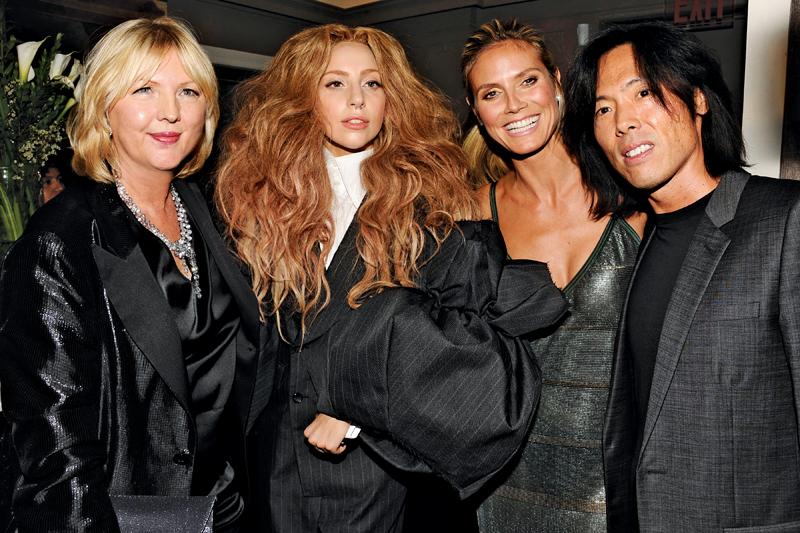
Brandusa Niro, Lady Gaga, Heidi Klum, Stephen Gan==The Daily Front Row First Annual Fashion Media Awards Sponsored by Maybelline New York, Samsung Galaxy and Pandora==Harlow, NYC==September 06, 2013==©Patrick McMullan==Photo – CLINT SPAULDING/ PatrickMcMullan.com== ==
Who is your most trusted confidant?
My husband [Giorgio Niro]. He’s incredibly supportive—he just believes in me, completely unconditionally. No matter what, I’m still the sunshine of his life.
Proust Questionnaire moment: What is your idea of perfect happiness?
I’m in the sunroom of my country house. Total quiet. Outside, it’s either beautiful summer or snowing, it doesn’t matter, because it’s toasty inside. The dog is next to me; Giorgio is on his iPad, commenting about various things he sees online. That’s it—my family. But I’d be super bored if I did that all the time. [Laughs] I know that I have this incredibly fun job, and I have you guys, who are my extended family and make me happy every day. I don’t have kids, so it’s really nice to have this interaction with people who are like-minded. If I had kids, probably they wouldn’t be nearly as like-minded as you! [Laughs] We have the same sense of humor, and are moved by more or less the same things. So all this is happiness for me.
No rosé in that scene?
Oh, of course. I was thinking more of the breakfast setting.
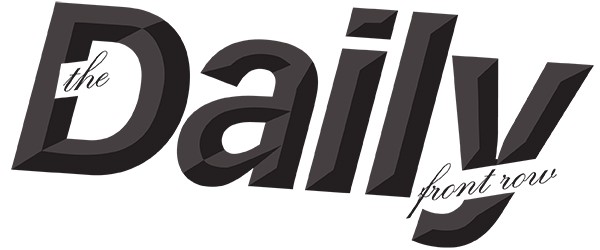

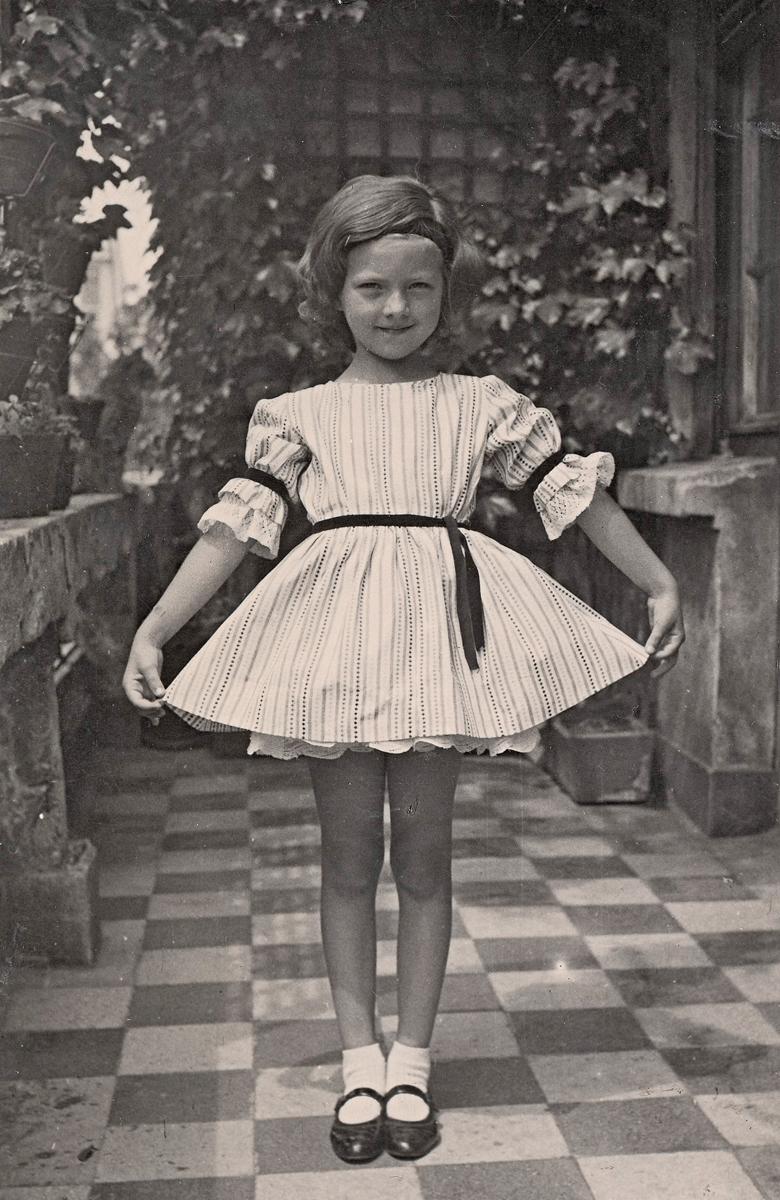
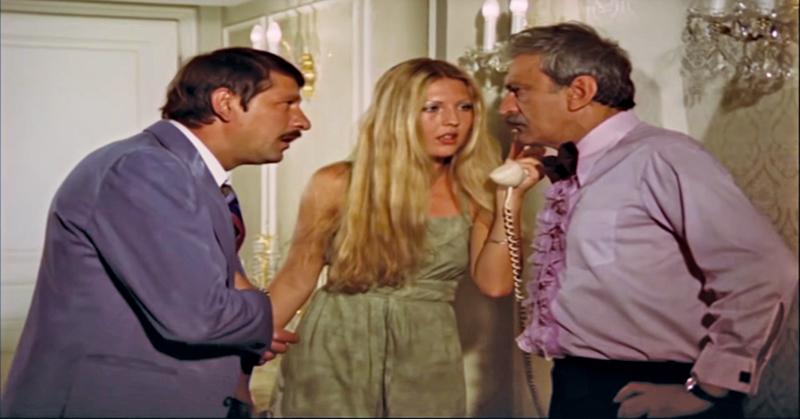
1 comment
I adore BRANDUSA, She’s smart, kind, and full of life. She is the daily!